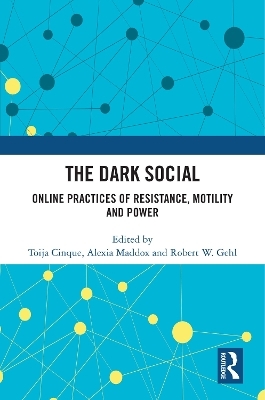
The Dark Social
Routledge (Verlag)
978-1-032-59345-6 (ISBN)
This book explores how people interact online through anonymous communication in encrypted, hidden, or otherwise obscured online spaces. Beyond the Dark Web itself, this book examines how the concept of ‘dark social’ broadens the possibilities for examining notions of darkness and sociality in the age of digitality and datafied life. The authors take into account technical, moral, ethical, and pragmatic responses to ourselves and communities seeking to be/belong in/of/ the dark.
Scholarship on the Darknet and Dark Social Spaces tends to focus on the uses of encryption and other privacy-enhancing technologies to engender resistance acts. Such understandings of the dark social are naturally in tension with social and political theories which argue that for politics and ‘acts’ to matter they must appear in the public light. They are also in tension with popular narratives of the ‘dark recesses of the web’ which are disparaged by structural powers who seek to keep their subjects knowable and locatable on the clear web. The binary of dark versus light is challenged in this book. The authors’ provocation is that practices of ‘dark’ resistance, motility and power are enacted by emerging data cultures. This book draws together scholarship, activism, and creativity to push past conceptual binary positions and create new approaches to darknet and dark social studies.
The Dark Social: Online Practices of Resistance, Motility and Power will be a key resource for academics, researchers, and advanced students of media studies, cultural studies, communication studies, research methods, and sociology. This book was originally published as a special issue of Continuum: Journal of Media & Cultural Studies.
Toija Cinque is Associate Professor of Communications (Digital Media) at Deakin University, Australia. Alexia Maddox is Senior Lecturer in Pedagogy and Education Futures, School of Education at La Trobe University, Australia. Robert W. Gehl is the Ontario Research Chair of Digital Governance for Social Justice at York University in Canada.
Introduction: Digital Cultures and Acts of Refusal, Secrecy and Power across Privacy Enhancing Technologies 1. Dark Web Advertising: The Dark Magic System on Tor Hidden Service Search Engines 2. A Study of Mastodon, Galaxy3 and 8Kun as Post-social Media in Dark Webs: The Darker Turn of Our Intimate Machines 3. The Electrified Social and its Dark Alternatives: Policing and Politics in the Computational Age 4. Bad Actors Never Sleep: Content Manipulation on Reddit 5. Dark, Clear or Brackish? Using Reddit to Break Down the Binary of the Dark and Clear Web 6. The Affective Pressures of WhatsApp: From Safe Spaces to Conspiratorial Publics 7. Great AI Divides? Automated Decision-Making Technologies and Dreams of Development 8. Shedding Light on “Dark” Ads 9. Critical Data Provenance as a Methodology for Studying How Language Conceals Data Ethics 10. Writing the Feminist Internet: A Chthonian Feminist Internet Theory for the Twenty First Century Afterword: Troubling the Dark Social
| Erscheinungsdatum | 09.11.2023 |
|---|---|
| Verlagsort | London |
| Sprache | englisch |
| Maße | 174 x 246 mm |
| Gewicht | 470 g |
| Themenwelt | Mathematik / Informatik ► Informatik ► Theorie / Studium |
| Sozialwissenschaften ► Kommunikation / Medien ► Kommunikationswissenschaft | |
| Sozialwissenschaften ► Kommunikation / Medien ► Medienwissenschaft | |
| ISBN-10 | 1-032-59345-8 / 1032593458 |
| ISBN-13 | 978-1-032-59345-6 / 9781032593456 |
| Zustand | Neuware |
| Informationen gemäß Produktsicherheitsverordnung (GPSR) | |
| Haben Sie eine Frage zum Produkt? |
aus dem Bereich


